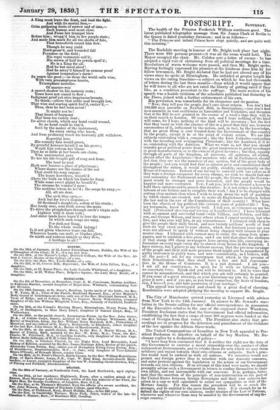The Rochdale meeting in honour of Mr. Bright took place
last night. There were 800 persona present—it was all the room would hold. The Mayor occupied the chair. Mr. Cobden sent a letter of excuse : he has adopted a rigid rule of abstaining from all political meetings for a time. Resolutions of warm welcome were passed, and then Mr. Bright spoke. Having feelingly expressed his pleasure at the kindness done him by his fellow townsmen, Mr. Bright declared that he had not altered any of his views since he spoke at Birmingham. He unfolded at greater length his views on the rating franchise—a subject on which he has had thousands of letters during the last three months—from which it would appear that he will leave to all who are not rated the liberty of getting rated if they like, as a condition precedent to the suffrage. The main section of his speech was a hostile criticism of the schedules published last Saturday in the Times, joined with a further enforcement of his own.
His peroration was remarkable for its eloquence and its passion.
"Now, they tell you the people don't care about reform. You don't find 100,000 men assemble on Newhall Hill, in Birminghamt—you don't find men assemble in vast multitudes in Lancashire and Yorkshire, and threaten that if the Bill be not granted in the course of a week's time they will be on their march to London. Of course not, and I hope nothing of the kind will come, for I hope nothing of the kind will be necessary ; but the fact that they taunt us with the absence of this is a proof that they are, however unconscious of it, influenced by the notion, and, in fact, by the knowledge, that no great thing is ever wrested from the Government of this country by the people, except it be at the point of violent action. We are like subjects contending with a conqueror ; like the Irish Catholics contending with the invading and subjugating Protestant; like the Lombard, if it be so, contending with the Austrian. What we want is, not that you should transfer great political power from the great landowners to great merchants or great manufacturers, or to the owners of great factories ; but that, equally through all parts of the kingdom, all interests, all opinions, all wishes, should affect the Legislature—that members who sit in Parliament should feel that they are not the members of any section, but of the great body of the people ; and you would find that as opinion grew and consolidated itself throughout the nation, it would act gently, steadily, omnipotently on the House of Commons. Instead of our having to contend with our rulers as if they were a foreign conqueror for every change, we wish we should find one soul animating the Parliament and the people, the Crown and the Govern- ment would be stronger and more honoured, and the people would be happier and more contented. Now, I ask you, is it to be deemed a heresy to hold these opinions and to preach this doctnne. Is it not rather to follow the labours of our fathers and to complete their work ? Am I to be charged with setting class against class when I wish to break down the wall of partition by which classes are created, and to make all Englishmen brethren before the law and in the eye of the Constitution of their country ? What have been the objects of my political life—twenty years of political life ? You, my townsmen, know it perfectly well. I call you as witnesses on my be- half. (Protracted cheering and waving of handkerchiefs.) I have laboured with an earnest and successful band—with Villiers, and Cobden, and Gib- son, and George Wilson, antrmany others whom I cannot mention, but who live, and who ever will live, in my remembrance. I laboured with them to give the people their daily bread, and now twenty millions' Forth of food finds its way every year to your shores, which but fourteen years ago you were not allowed to speak of without being charged with treason to your master class. I laboured with earnest men to strike the stamp from news- papers, and to establish a free press, and I am told that since the abolition of that stamp 300 cheap newspapers have sprung into life, conveying in- formation on every topic every day to almost every house in the kingdom. I have striven, but I grieve to say without success, that the precious earnings of the people and their still more precious blood might not be squandered by guilty statesmen in guilty wars, and now—consistently, as I believe, with all the past—I ask for my countrymen that which is the promise of their Constitution—that they shall have a fair and full representa- tion in the House of Commons. It is a just demand. I ask you— I ask all my countrymen, to speak for it with no faltering, with no uncertain voice. Speak and you will be listened to. Ask in tones that cannot be misunderstood, and that which you ask will certainly be granted. If you come of a great ancestry, as your historians say you do, do not dis- grace it now ; and if you are, as you boast yourselves, the heirs of freedom, rise, I beseech you, and take possession of your heritage." This appeal was interrupted and closed by a great deal of cheering. Resolutions were adopted pledging the meeting to support Mr. Bright.


























 Previous page
Previous page